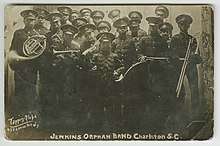Jenkins Orphanage
The Jenkins Orphanage (now officially known as the Jenkins Institute For Children) was established in 1891 by Rev. Daniel Joseph Jenkins in Charleston, South Carolina. Jenkins was a businessman and Baptist minister who encountered street children and decided to organize an orphanage for young African Americans.[1]
.jpg)
The original site of this orphanage was at 660 King Street, but the number of orphans on roll quickly outgrew the facilities. In 1893, the orphanage moved to the Old Marine Hospital at 20 Franklin Street. This National Historic Landmark, designed by Robert Mills, served as home of the orphanage until 1937. Its present-day location is in North Charleston, South Carolina.
Jenkins Orphanage Bands

The orphanage took in donations of musical instruments. Not being a musician, Jenkins hired two local Charleston musicians — P.M. "Hatsie" Logan and Francis Eugene Mikell — to tutor the children in music. Upon its establishment, it became the only black instrumental group organized in South Carolina. The band's debut was on the streets of Charleston with the permission of the mayor, police chief, and Chamber of Commerce. The Jenkins Orphanage Band, wearing discarded Citadel uniforms, performed throughout the United States and even toured England raising money for the support of the orphanage. It played in inaugural parades of Presidents Theodore Roosevelt and William Taft. It appeared at the St. Louis Exposition and the Anglo-American Exposition in 1914. It toured the United States from coast to coast, and played in Paris, Berlin, Rome, London, and Vienna. As many as five bands were on tour during the 1920s. The band ceased to exist in the 1980s.[2]
In 2003, a 10-minute Fox Movietone News newsreel feature about the band, filmed on November 22, 1928, was selected for preservation in the National Film Registry by the Library of Congress, being deemed "culturally, historically, or aesthetically significant". [3] [4]
William "Cat" Anderson, Jabbo Smith, Tom Delaney,[5] and Freddie Green are but a few of the alumni from the Jenkins Orphanage band who made it to the big time. The orphanage was responsible for providing numerous children with another chance, which many took advantage of by going on to lead productive lives, including teachers and attorneys. Luther M. Reames Jr., Esq. is a vice-president with a major bank and an example of a Jenkins Orphanage success story.
References
- Jack McCray (6 June 2007). Charleston Jazz. Arcadia Publishing. p. 25. ISBN 978-0-7385-4350-5. Retrieved 26 October 2012.
- Edgar, Walter. South Carolina Encyclopedia (2006) pp. 590-591, ISBN 1-57003-598-9
- "Librarian of Congress Adds 25 Films to National Film Registry". Library of Congress, Washington, D.C. 20540 USA. Retrieved 2020-06-16.
- "Complete National Film Registry Listing | Film Registry | National Film Preservation Board | Programs at the Library of Congress | Library of Congress". Library of Congress, Washington, D.C. 20540 USA. Retrieved 2020-06-16.
- Bruce Bastin (1995). Red River Blues : The Blues Tradition in the Southeast (First ed.). Illini Books. p. 47. ISBN 0-252-06521-2.
Bibliography
- John Chilton (1980) A Jazz Nursery: The Story of the Jenkins' Orphanage Bands of Charleston, South Carolina, 60 p., London, U.K.: Bloomsbury, ISBN 095012902X.
External links
| Wikimedia Commons has media related to Jazz. |
- Fox Movietone News: Jenkins Orphanage Band essay by Julie Hubbert at National Film Registry
- Fox Movietone News: Jenkins Orphanage Band essay by Daniel Eagan in America's Film Legacy: The Authoritative Guide to the Landmark Movies in the National Film Registry, A&C Black, 2010 ISBN 0826429777, pages 153-155
- Jenkins Institute For Children
- Avery Research Center
- University of South Carolina Archives
- Time Magazine
- The Charleston Jazz Initiative
- South Carolina Music Hall of Fame
- Charleston Jazz by Jack McCray
- Fox Movietone News: Jenkins Orphanage Band on IMDb
- Excerpt of Fox Movietone News: Jenkins Orphanage Band at the South Carolina University Libraries Moving Image Research Collections